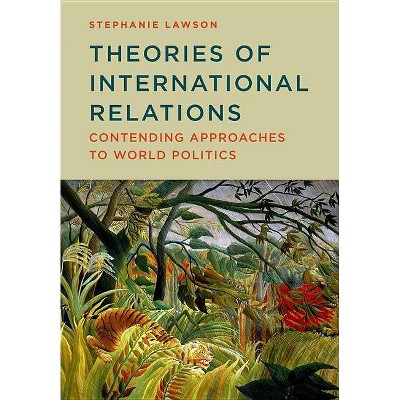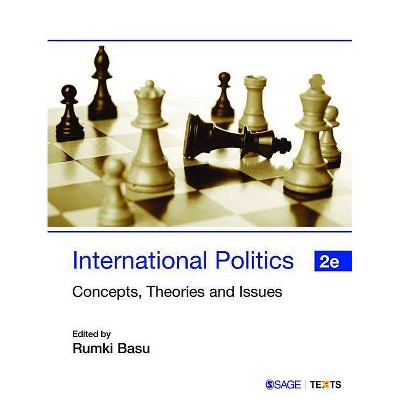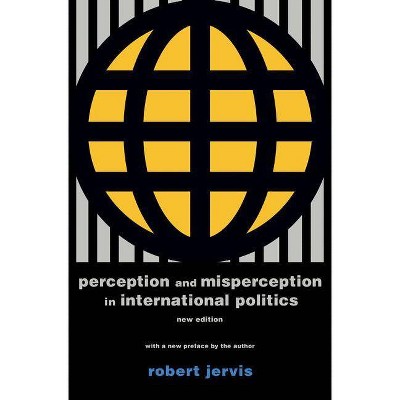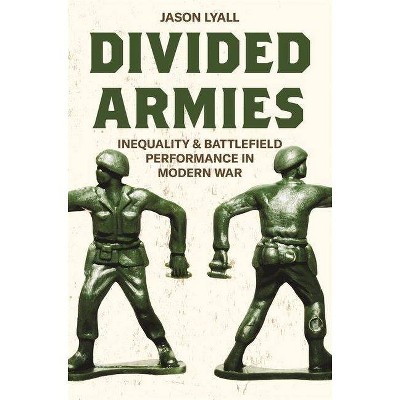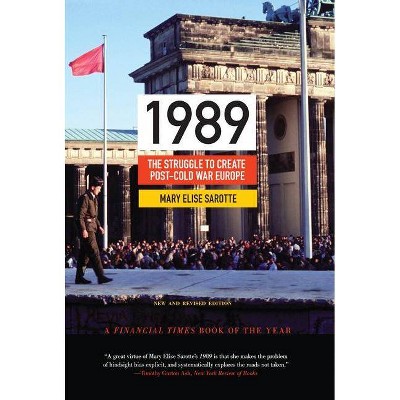Theories of International Politics and Zombies - by Daniel W Drezner (Paperback)
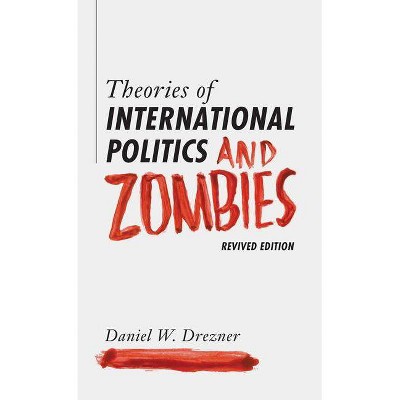
Similar Products
Products of same category from the store
AllProduct info
<p/><br></br><p><b> Book Synopsis </b></p></br></br><p>What would happen to international politics if the dead rose from the grave and started to eat the living? Daniel Drezner's groundbreaking book answers the question that other international relations scholars have been too scared to ask. Addressing timely issues with analytical bite, Drezner looks at how well-known theories from international relations might be applied to a war with zombies. Exploring the plots of popular zombie films, songs, and books, <i>Theories of International Politics and Zombies</i> predicts realistic scenarios for the political stage in the face of a zombie threat and considers how valid--or how rotten--such scenarios might be. <p/>This newly revived edition includes substantial updates throughout as well as a new epilogue assessing the role of the zombie analogy in the public sphere.</p><p/><br></br><p><b> From the Back Cover </b></p></br></br><p>"One of the most creative books about international relations you will ever read and one of the smartest."<b>--Peter Beinart, author of <i>The Icarus Syndrome</i></b></p><p>"Bless Dan Drezner for this book which punches huge holes in the hokum of American foreign policy thinking. Our theories in this business have been thin and often very costly, and if it takes Drezner's 'zombie attack' to puncture their bloat, so be it. Besides, the book is fun."<b>--Leslie H. Gelb, president emeritus of the Council on Foreign Relations and former <i>New York Times</i> columnist</b></p><p>"Drezner is to the zombie attack what Thucydides is to the Peloponnesian War--he is its great chronicler. As witty as he is insightful, Drezner has taken old ideas and traditions in international relations and brought them back to life."<b>--G. John Ikenberry, Princeton University</b></p><p>"This book fills a gnawing gap in the international relations literature and adds flesh to those bones by communicating key international relations theories in a fresh, fun, and effective way."<b>--Daniel Nexon, Georgetown University</b></p><p>"This interesting, thoughtful, and engaging book nicely integrates the classics of zombie work with theories of international politics to make sense of human--and nonhuman--behavior. This is the only international politics textbook that will make students frequently laugh and think at the same time. Indeed, this textbook is food for brains, which may, of course, only attract more zombies."<b>--Stephen Saideman, McGill University</b></p><p/><br></br><p><b> Review Quotes </b></p></br></br><br>[<i>Theories</i>] <i>of International Politics and Zombies</i> is clever, nicely dissecting the strengths and weaknesses of different theories and offering observations about how, for instance, constructivists should destroy all previously published-zombie-apocalypse movies, lest people actually act as selfishly as most characters in those films do. While most zombie narratives start after government has failed, Drezner is far more optimistic that through cooperation, humanity would survive a zombie outbreak.<b>---Samantha Nelson, <i>A.V. Club</i></b><br><br>A light, breezy volume, <i>TIPZ</i> is a valuable primer in international relations theory for laypeople, and thank God for that--it's been a long time coming. But Drezner's real genius is that he's written a stinging postmodern critique of IR theorists themselves, applying the full force of their structured reasoning to topics as diverse as Michael Jackson's breakdancing zombies, Peter Jackson's lesser film canon, and romantic zombie comedy flicks--'rom zom coms, ' as he puts it. It's both a pedagogical text and a lampoon of pedagogy. . . . <i>Theories of International Politics and Zombies</i> is one hell of an important tome.<b>---Adam Weinstein, <i>Mother Jones</i></b><br><br>Besides offering a condensed and accessible survey of how various schools of international-relations theory would respond, he reviews the implications of a zombie crisis for a nation's internal politics and its psychosocial impact. He also considers the role of standard bureaucratic dynamics on managing the effects of relentless insurgency by the living dead. While a quick and entertaining read, <i>Theories of International Politics and Zombies</i> is a useful introductory textbook on public policy--as well as a definitive monograph for the field of zombie studies.<b>---Scott McLemee, <i>Inside HigherEd</i></b><br><br>Honorable Mention for the 2011 PROSE Award in Government & Politics, Association of American Publishers<br><br>If the dynamics of international politics have conventionally been understood in terms of the quick and the dead, Daniel Drezner invites us to consider another way of being--undead, or 'differently animated.' This ontological category emerges from the world of popular culture in which the 'zombie canon has a distinctive place. In drawing together the interpretation of popular culture and international politics, Drezner provides much food for thought--the food in this case being human flesh, of which zombies are notoriously fond. . . . [D]rezner elucidates the often-arcane world of international theory in an interesting and highly amusing way. He also shows how close the relationship between politics and popular culture is, how the latter can convey social and political critique in the most unlikely ways, and why satire remains such an important form of that critique.<b>---Stephanie Lawson, <i>Times Higher Education</i></b><br><br>In addition to wargaming various zombie scenarios, Drezner's book serves as an entertaining primer on the distinctions between several theories of international politics.<b>---Katherine Mangu-Ward, <i>Reason</i></b><br><br>In the end, Drezner's task is to lead a tour through academic Graceland, pretending political theories are serious business, while mocking academia's obsession with political theories, which any person with common sense knows too often fail to predict real world outcomes. A political science book about zombies is funny not because of the zombies, but because political science treats them like everything else. The juxtaposition of the two brings out the best in both.<b>---Jessica Palmer, <i>Biophemera</i></b><br><br>Overall, this is an accessible first introduction for students unfamiliar with the philosophical side of international relations.<b>---Christopher Housenick, <i>Political Studies Review</i></b><br><br>[A]n amusing primer on IR theory, a comprehensible introduction to the tenets of liberalism, neo-conservatism, social constructivism, bureaucratic politics, realpolitik, and insight into their plausible responses to a new type of threat.-- "San Francisco Book Review"<br><br>Drezner . . . comes up with an intriguing intellectual conceit to explain various schools of international political theory. He imagines a world overrun with zombies and considers the likely responses of national governments, the U.N and other international organizations, and nongovernment organizations (NGOs). . . . This slim book is an imaginative and very helpful way to introduce its subject--who knew international relations could be this much fun?-- "Publishers Weekly"<br><br>It's attractive quality is, of course, its flesh-eating meta-theme, but the work is successful for its clear, comparative introduction to international relations theory. . . . Drezner's work frequently leaves the reader hungry for more discussion.-- "Choice"<br><br>Juxtaposing George A. Romero with Donald Rumsfeld to make real-world 'predictions, ' Daniel W. Drezner's <i>Theories of International Politics & Zombies</i> . . . explores feasible scenarios for the political stage contrasted with an undead threat, the objective being to render just 'how valid--or how rotten--such scenarios might be.' No man seems better qualified for this exposé than Drezner, whose bio credentials list him as a member of the Council on Foreign Relations and the Zombie Research Society.-- "Fangoria"<br><br>Smart, funny, creative, and thought provoking, <i>Theories of International Politics and Zombies</i> is a worthwhile and engaging read, and is essential reading for all political leaders if the fight against zombies is ever to be won.<b>---Sara Yasin, <i>LSE British Politics and Policy blog</i></b><br><p/><br></br><p><b> About the Author </b></p></br></br><b>Daniel W. Drezner</b> is professor of international politics at the Fletcher School of Law and Diplomacy at Tufts University. His books include <i>All Politics Is Global</i> (Princeton). He is a member of the Council on Foreign Relations and the Zombie Research Society.
Price History
Price Archive shows prices from various stores, lets you see history and find the cheapest. There is no actual sale on the website. For all support, inquiry and suggestion messagescommunication@pricearchive.us
